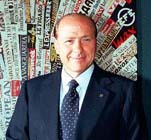A new Berlusconi?
 Rome - By the standards of Silvio Berlusconi, the billionaire who brought show-business to Italian politics, the April 13-14 elections campaign got off to a subdued start.
Rome - By the standards of Silvio Berlusconi, the billionaire who brought show-business to Italian politics, the April 13-14 elections campaign got off to a subdued start.
In a Rome square, Berlusconi presided over what his People of Freedom party billed as the launch of the "Voyage of Freedom": 200 vans criss-crossing Italy to promote the movement.
However, the hundred or so people who attended were a far cry from the thousands who normally turn out for Berlusconi rallies. Only two vans were actually in sight.
"Everybody already knows our programme. Go out there and show the people our party's symbol," Berlusconi told his activists manning the vans.
The 71-year-old, three-times former premier was referring to the one major novelty of his campaign, the fifth since he entered politics in 1994.
Instead of running with his traditional Forza Italia party, this time Berlusconi leads the People of Freedom, a merger with his long-time coalition partners, the post-Fascist National Alliance.
The message, however, has remained essentially the same: entrepreneurial values to cure Italy of its maladies which Berlusconi blames on the bureaucracy and "Communists." Berlusconi's main rival, Democratic Party leader Walter Veltroni, called it "tired rhetoric."
However, with election day approaching and Veltroni catching up in the opinion polls, Berlusconi has assumed more aggressive tones.
He vowed that once elected he will clear the rubbish from the streets of Naples along with the centre-left politicians who, he says, allowed the refuse to pile up in the city in the first place.
Born in Milan to a bank official and a secretary, Berlusconi's rise to riches reads like the classic tale of a self-made man. It was nonetheless inappropriately embellished in the book "An Italian Story" posted to Italian households on the eve of past elections, according to critics.
Berlusconi's big break came from his involvement in the real estate market in the early 1970s in Milan, the country's financial capital and industrial hub. By the end of the decade he had branched out into television, owning several local stations.
The stage was set for Berlusconi to extend his media empire in the mid-1980s, when the then prime minister Bettino Craxi - a close friend who later fled the country to avoid facing corruption charges - opened the national airwaves to private broadcasters.
Along the way, the former cruise ship crooner acquired top-flight football club AC Milan and became the subject of several probes on his business dealings.
In 1994, in the wake of the "Bribesville scandal" implicating the governing Christian Democrats and Socialists, Berlusconi formed Forza Italia and won elections in coalition with other conservative parties later that year.
His first term as premier lasted just seven months, as the government collapsed due to internal differences. However, after losing the 1996 elections he was back in power in 2001.
That stay in office lasted five years, longer than that of any Italian premier since the World War II. It was marked by a series of judicial cases for which the centre-right-controlled parliament passed laws granting prime ministers immunity.
On the foreign front Berlusconi supported the US invasion of Iraq, a stance that won praise in Washington. Italy's tenure as European Union president was embarassed by the premier's comparing a German member of the European Parliamentarian to a "concentration camp guard."
Italians who saw their buying power decline under his government handed him defeat in the 2006 elections, but the demise of Romano Prodi's centre-left government in February has paved the way for another Berlusconi comeback. (dpa)